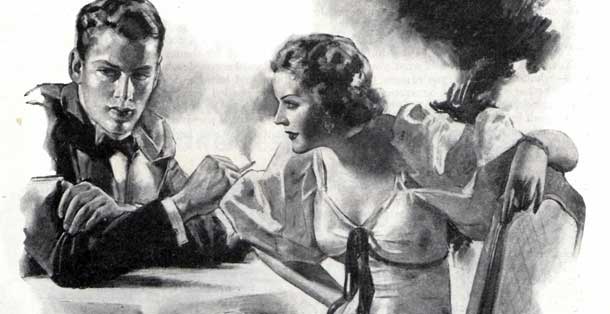In 1930s, humorist J.P. McEvoy wrote the Post column “Father Meets Son” presented to readers in the form of letters filled with advice for navigating life’s rocky road. Employing a mix of wry humor and tough love, Dad doled out life lessons on everything from work to women. Readers loved it.
When his son is in the romantic deep end after becoming the focus of the boss’ daughter, Dad offers little help on how to hold off the girl and hold on to the job.
Father Meets Son: The Boss’s Daughter
By J.P. McEvoy
Originally published on May 1, 1937
Dear Son: Your letter received yesterday charmed me and flattered me, disturbed me a little and amused me a lot. It would seem the boss’s daughter is pursuing you and you are giving out delicate cries for help — or are they bids for applause? If you encourage her, her father probably will fire you. If you don’t, the daughter will have you fired anyway. Meanwhile she worries you, you worry her mother, and I am supposed to worry about all of you. Fine chance!
I seem to recall that Gloria has been a problem to you ever since you started driving her father, her mother, and herself. At first she was a spoiled brat — your words — she kept you on the jump, made you fetch and carry, and gave you the business when her friends were around. It was good discipline for you and I am glad you survived it. Now she insists you join up on her parties, even when you know her father would disapprove of your stepping out of character as the family chauffeur; more and more, she monopolizes your time and the family car, putting you in a spot where you have to conspire with her against the wishes of her parents; she expects you to be a good pal with her, but a perfect servant when her mother is around. And the strain is getting you down. Says you.
I suspect you.
I suspect you have forgiven her for the rough handling she gave you at the start. I suspect you rather enjoy your new power over her. I suspect that the spice of adventure and the dash of intrigue she is adding to your job more than compensate for the qualms you profess to have. In short, I suspect you are thinking of yourself as a devil of a fellow in your own way, and you would like for me to know about it.
If this is true, there is little for me to say and less to do. If it isn’t true, it is still your baby. I could point out that your first loyalty is to your employer, but you know that already. I could say, now is the time to be discreet and tactful, and a diplomat with the lady. The last above all, since it amounts to fighting fire with fire, if the classic story is to be believed. You may recall it — the difference between a diplomat and a lady? If a diplomat says “yes,” he means “perhaps”; if he says “perhaps,” he means “no”; if he says “no,” he is no diplomat. While if a lady says “no,” she means “perhaps”; if she says “perhaps,” she means, “yes”; if she says “yes,” she is no lady!
In any case, you are in an adult spot. Your troubles, until now, were mere whooping cough and measles. Come on in, the water’s fine, but it’s way up to here. No use trying to keep your feet on the ground if you are going to swim. And swim you must, because you’ll be out of your depth most of the time. So, learn first to take care of yourself, and second not to fancy yourself a super lifeguard chosen by Providence to rescue all the pretty girls who holler “Help” for, sad but true, they swim better than you.
As a matter of fact, the situation is not nearly so painful as you seem to think. And even if it were, it’s a valuable experience — especially valuable right now when you are starting out. You have stubbed your toe on an old nugget of wisdom. You have learned at a tender age that man is not always the pursuer. That the romantic lead is more likely to be Herbert Marshall than Harpo Marx.
The realization of this profound truth so early in the game will save you a lot of time, money, mental discomfort and spiritual bruises. Men who spend most of their energy on the prowl, trying to impress women, are usually men who are not privately impressed with themselves. They feel unsure about most things that really count, and of women more than anything else. And women are the first to sense this. The aggressive male is always leading with his chin, his guard is down, and he’s as wide open as an oyster on the half shell. Easily lured into a clinch, a quick jolt to the heart does the trick.
But always the champion, in love or war, is quiet because he is sure, and mild in repose because he is deadly in action. He doesn’t need to brag to impress nor bluster to impose, and, above all, he knows he is not compelled to accept every challenge and meet every corner in order to prove how good he is. The prelim’ palooka, on the contrary, meets them all. And because he is always on his toes, he usually winds up on his heels, punch-drunk and slap-happy.
Your problem, to be sure, is different, and more difficult: How to hold off the girl and hold on to the job. I am flattered that you should think I know the formula. Joseph in the house of Potiphar was wiser than all his brethren, and he couldn’t keep out of jail when confronted with a situation somewhat similar. The man who wrote “Hell hath no fury like a woman scorned” was waxing eloquent about the problem, but was silent about the solution.
But, even if I told you what to do, by the time this letter reaches you, you will have done 18, and the girl 23 new things that will have altered the situation entirely. If you don’t like the girl and show it, you will lose your job. If you don’t like the girl and you can hide it from her, you don’t need to take advice — you can give it. If you like the girl, let her handle the father — she’ll do it, anyway, and do it better. If the father likes you and the girl likes you, you’re tagged. If neither the father nor the mother likes you, but the girl does, remember that Roosevelt didn’t carry Maine and Vermont either, but he did all right for himself.
At this point I review what I have just written to you, and the realization that you won’t pay any attention to it comes to me like an old sweet refrain. In consequence, a great wave of apathy steals over me. You and your troubles with your girl friends recede into a misty distance. I hear your voice, like an echo far away, repeating, “Poor old fellow. What does he know about such things? I’ll handle my own affairs.”
Pardon me, while I totter off the field and climb up to my place in the stand with the old grads. It’s your play and you have the ball. And am I glad!
Affectionately,
Dad
Previous: The Other Fellow
Coming soon: Being in Love
Become a Saturday Evening Post member and enjoy unlimited access. Subscribe now




Comments
This was very well written and fascinating. Although old fashioned overall, there’s enough timely advice here to be heeded if you should find yourself in a similar predicament today.
By the way, the Ralph Coleman illustrations are great. They really capture the emotional turmoil of the subjects, as well as (for the time) the state-of-the-art look of the Thirties.